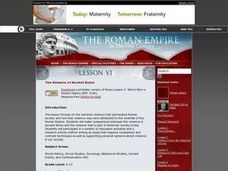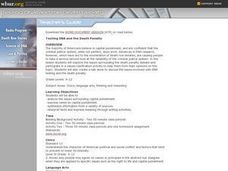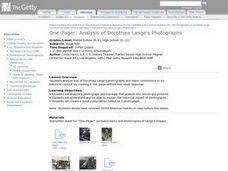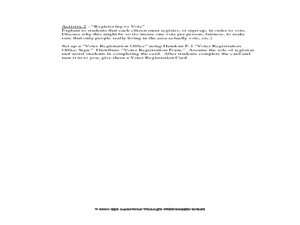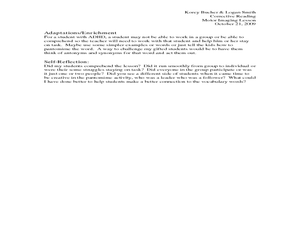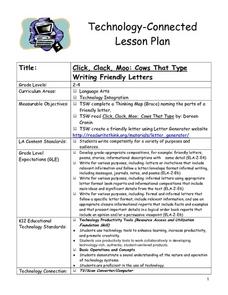Curated OER
The Violence of Ancient Rome
Students compare the violence in ancient Rome and the violence in American society today. They research and write an essay that requires comparison and contrast techniques as well as supporting personal opinions about violence in our...
Curated OER
Listening To A Guest Speaker
Young scholars participate in a lesson of listening to a guest speaker. They pay attention to the information and are active in taking notes, generating follow up questions, and summarizing the presentation. Students practice clear...
Curated OER
"I Have the Right Club"
Students explore issues facing society today. In this social studies lesson plan, students discuss human rights concepts. Students discuss the role they play in promoting the idea of freedom.
Curated OER
Debating for Land
Students research pertinent information based on historical facts and is supported by quotations from primary sources in order to prepare for a class debate about land ownership in the 19th century.
Curated OER
How Do Values Shape Conflicts?
Pupils work through conflict. In this conflict resolution lesson, students participate in a simulation that requires them to consider both sides of the whaling issue.
Curated OER
Youth Leading the Way
Students share opinions about groups or activities that give meaning to their lives. They read and discuss the article "Challenging Tradition, Young Jews Worship on Their Terms". Afterward, they investigate and write news articles about...
Curated OER
Testing DNA and the Death Penalty
Students explore issues surrounding death penalty debate and participate in a values-clarification activity to help them form their opinions on this topic. They create a talk show to discuss issues involved with DNA testing and the death...
Curated OER
The Sculpture of Henry Moore
Eighth graders complete a unit of lessons on the characteristics of Henry Moore's sculpture. They examine and discuss examples of Moore's sculpture, identify the defining characteristics, write an essay, and create a sculpture in the...
Curated OER
Block the Shock Jock or Not?
Pupils examine their own experiences with racist and sexist speech by deciding whether or not they agree or disagree with statements related to this subject. They explore the limits of public speech by reading about the controversy...
Curated OER
The Art of Persuasion
Students practice persuasive writing by creating a travel brochure. In this creative writing instructional activity, students research a popular tourist destination they would like to visit and create a brochure enticing readers to...
Curated OER
Ownership of Lands
Students study the levels of forest ownership and how each are managed. In this land ownership instructional activity students research timber companies and complete a writing assignment.
Curated OER
Universal Love
Students discuss the importance of various cultures getting along with one another. Individually, they think of a time in which they helped someone who was worse off then them and share it with the class. To end the lesson, they...
Curated OER
Goal Setting: Respect for ALL Workers
Students discuss their views on the importance of various jobs. For this career paths and goal-setting lesson, students create a list of all jobs required to produce a particular object. Students then prioritize the importance of...
Curated OER
Analysis of Dorothea Lange's Photographs
Young scholars analyze a photo of Dorothea Lange and make connections to its historical context by creating a written and visual response. In this photograph analysis lesson, students analyze Lange's photograph and explain the historical...
Curated OER
What is a "vote"
Students read and discuss why we vote, and fill out worksheets on voting. In this voting lesson plan, students read and discuss the voting process, and obtain mock voter registration cards.
Curated OER
Acting Out as we Go
Fourth graders use motor imaging to remember the definitions of words. In this vocabulary lesson plan, 4th graders work in groups to make a pantomime to help them remember a word. Students document the experience in their notebooks.
Curated OER
Bias vs. Perspective: An Inevitable Aspect of Journalism?
Students explore the types of media that U.S. teens prefer the ways in which viewers identify and account for journalistic bias. They explore the ways in which media shapes one's opinion or affects their judgment.
Curated OER
A Body Dilemma
Young scholars explore the pros and cons of the selling of body parts in this lesson. A discussion of how personal value systems impact science and research is developed.
Curated OER
To Cut or Not To Cut
Learners examine the pros and cons of animal dissection and discuss various case studies in animal dissection. They research various perspectives of using animals as learning tools and write a position paper which tells their opinion on...
Curated OER
English Colonization
Fifth graders discuss their prior knowledge of what colonization means and give their opinions of why someone would want to start a colony. After recording their answers on web map they read about the English colonization in their books;...
Curated OER
Cows That Type Friendly Letters
Students engage in a lesson that introduces the parts of a letter. The lesson is taught using a powerpoint presentation with the purpose of integrating technology into instruction. Students create a letter and thinking map to challenge...
Curated OER
Persuasive Essay PowerPoints
Students address issues important to them by creating a PowerPoint presentation. In this persuasive writing lesson, students discuss issues with their classmates that they wish to address through a persuasive essay they will write....
Curated OER
A MATTER OF PERSPECTIVE: COLUMBUS IN THE NEW WORLD
Eighth graders study the famous explorer Christopher Columbus. In this World History lesson, 8th graders analyze and compare primary and secondary sources. Students discuss as a class the accomplishments of Columbus.
Curated OER
Freedoms of the Press
Students examine journalism ethics. In this journalism lesson, students complete a think, pair, share activity about the journalistic code of ethics. Students then discuss an ethics scenario.


